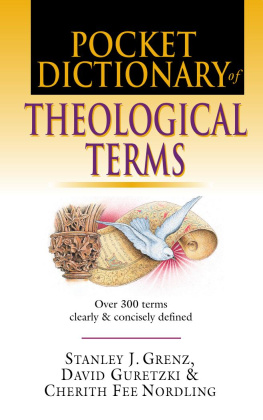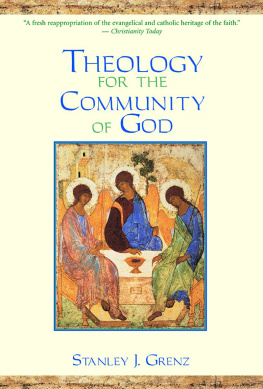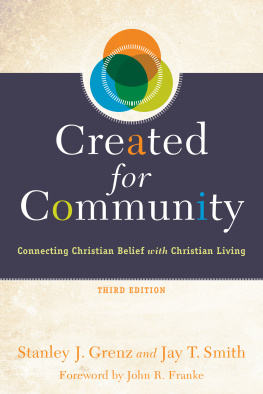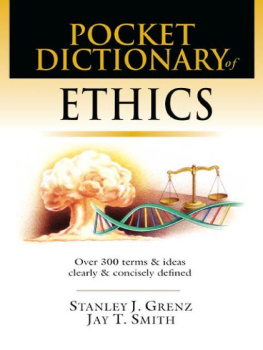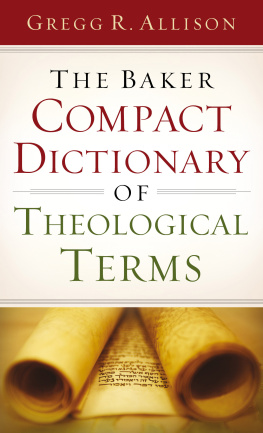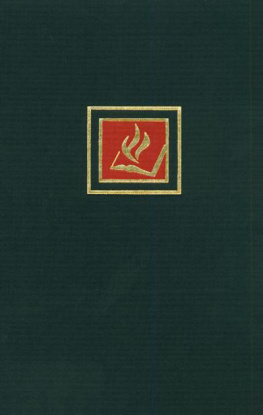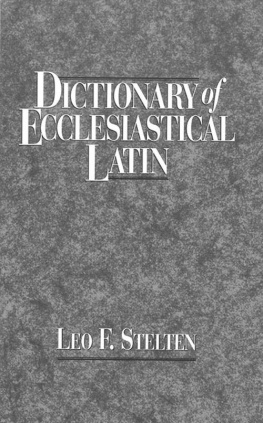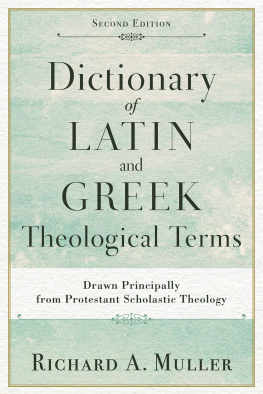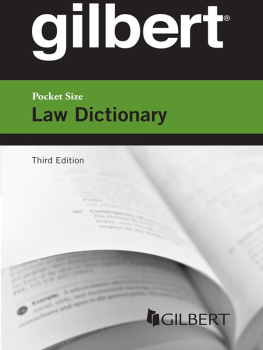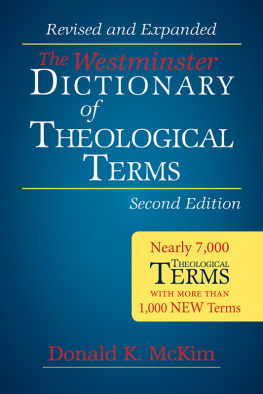Stanley J. Grenz - Pocket Dictionary of Theological Terms
Here you can read online Stanley J. Grenz - Pocket Dictionary of Theological Terms full text of the book (entire story) in english for free. Download pdf and epub, get meaning, cover and reviews about this ebook. year: 2000, publisher: IVP Academic, genre: Religion. Description of the work, (preface) as well as reviews are available. Best literature library LitArk.com created for fans of good reading and offers a wide selection of genres:
Romance novel
Science fiction
Adventure
Detective
Science
History
Home and family
Prose
Art
Politics
Computer
Non-fiction
Religion
Business
Children
Humor
Choose a favorite category and find really read worthwhile books. Enjoy immersion in the world of imagination, feel the emotions of the characters or learn something new for yourself, make an fascinating discovery.
- Book:Pocket Dictionary of Theological Terms
- Author:
- Publisher:IVP Academic
- Genre:
- Year:2000
- Rating:4 / 5
- Favourites:Add to favourites
- Your mark:
- 80
- 1
- 2
- 3
- 4
- 5
Pocket Dictionary of Theological Terms: summary, description and annotation
We offer to read an annotation, description, summary or preface (depends on what the author of the book "Pocket Dictionary of Theological Terms" wrote himself). If you haven't found the necessary information about the book — write in the comments, we will try to find it.
Pocket Dictionary of Theological Terms — read online for free the complete book (whole text) full work
Below is the text of the book, divided by pages. System saving the place of the last page read, allows you to conveniently read the book "Pocket Dictionary of Theological Terms" online for free, without having to search again every time where you left off. Put a bookmark, and you can go to the page where you finished reading at any time.
Font size:
Interval:
Bookmark:

STANLEY J. GRENZ, DAVID GURETZKI & CHERITH FEE NORDLING


"You can't know the players without a scorecard!" claim the program vendors as they make their way through ballpark stands. In a similar manner we might say, "You can't understand theology without definitions."
This Pocket Dictionary attempts to provide a basic understanding of the three hundred or so significant words and concepts you are most likely to encounter in the theological books and articles you are reading. The entries consist primarily of English terms, but we also have included key foreign phrases-especially Latin and German-as well as a select group of theologians who have played central roles in the history of theology.
In using the Pocket Dictionary keep several things in mind. First, the format of the book is quite simple. The terms, phrases and names are arranged together in alphabetical order. Second, we have focused our attention on basic, generally held definitions. Rather than being exhaustive treatments, therefore, our descriptions seek to provide you with a foundational, working knowledge of the concepts. This working knowledge in turn ought to place you in a position to glean a fuller understanding from the theology texts you are reading, the lectures you are hearing or even the information you find in more exhaustive theological dictionaries. Third, while much of the material we present is generally accepted among the various Christian traditions, the fact that we write from a broadly evangelical, Protestant perspective is clearly evident from time to time.
The Pocket Dictionary is a reference book. Thus we do not intend that you read it from cover to cover. Rather we anticipate that you will have it next to you or on your desk as you read theological literature. You can then consult the Pocket Dictionary when you come across a term that is unfamiliar to you. If you are a student, you might also use it as a "crib sheet" to help you prepare for whatever definition-oriented exams you might encounter.
Being a reference book, the Pocket Dictionary is cross-referenced. An asterisk before a term or phrase indicates that it appears elsewhere in the book as a separate entry. See and see also references indicate entries that might provide additional information. Typical abbreviations found in reference works like the Pocket Dictionary include c. (circa) meaning "approximately," b. standing for "born" and d. meaning "died."
As members of Christ's church and disciples of Jesus we find reading theology highly rewarding. We hope you will too. And we hope that this Pocket Dictionary will assist you in the process.
The Authors
a posteriori, a priori. Terms used to refer to whether an assertion is dependent on experience (a posteriori) or independent of experience (a priori). For example, if one observes creation and sees in it an organized pattern, it might be concluded a posteriori (i.e., on the basis of observing creation) that God exists as its cause. However, if God's existence can be proved on some basis prior to sense experience, then the existence of God is argued a priori.
accommodation. Speaks of God making himself known to humans in words and ways suitable for the finite human mind to comprehend. The most significant example in which God accommodates to humankind is found in the coming of Jesus Christdeity taking human form. See also incarnation.
adiaphora. Items of belief not essential to *salvation. In Lutheran thought the adiaphora were defined as practices of the church that were neither commanded nor forbidden in Scripture. In contemporary terms, adiaphora are those things not clearly addressed by Scripture that Christians may freely practice or believe with a clear conscience before God and that do not affect salvation.
adoption. God's act of making otherwise estranged human beings part of God's spiritual family by including them as inheritors of the riches of divine glory. This adoption takes place through our receiving in faith the work of Jesus Christ the Son (Jn 3:16), being born of the Spirit (Jn 3:5-6) and receiving the Spirit of adoption (Rom 8:15-16). See also reconciliation.
adoptionism. The theory that asserts that God adopted Jesus of Nazareth as his Son. In other words, Jesus was born human but became God's Son at a particular point in his life. This theory fails to reflect scriptural texts that point to Jesus' eternal relationship with the Father (e.g., Jn 17:5).
advent. Literally meaning "coming" or "arrival," this term refers to the coming of Jesus Christ to earth to provide *salvation by his life, death, resurrection and ascension. Christians now anticipate a second advent when Christ will return to earth in bodily form to receive the church and to judge the nations. The term Advent also refers to a season of the church year during which the church prepares to commemorate Christ's first coming to earth (Christmas). The Advent season encompasses the four Sundays prior to Christmas Day. See also parousia.
aesthetics (esthetics). The area of philosophy formally concerned with defining the nature of beauty and discovering criteria or standards by which something can be evaluated as beautiful. In Christian theology beauty is usually defined as what reflects in some way God's own character and nature. See also ethics.
agnosticism. Literally, "no knowledge" and taken from two Greek terms, a (no) and gnosis (knowledge). In a more formal sense agnosticism refers to a system of belief in which personal opinion about religious statements (e.g., "God exists") is suspended because it is assumed that they can be neither proven nor disproven or because such statements are seen as irrelevant. See also atheism.
Alexandrian school. So called because of its origin in the city of Alexandria (Egypt), this Christian center of scholarship was led first by Clement of Alexandria in A.D. 190 and then by *Origen in A.D. 202. The Alexandrian school was influenced by the philosophy of Plato and understood the task of biblical interpretation as seeking out its literal, moral and allegorical senses. In other words, the Alexandrian theologians taught that although the Bible was literally true, its correct interpretation lay in the moral or allegorical senses more than in the literal sense. See also Antiochene school.
allegory, allegorical method. An allegory is a story in which the details correspond to or reveal a "hidden," "higher" or "deeper" meaning. The allegorical method of biblical interpretation assumes that biblical stories should be interpreted by seeking the "spiritual" meaning to which the literal sense points. See also typology.
arnillennialism. The belief that the thousand years mentioned in Revelation 20 do not represent a specific period of time between Christ's first and second comings. Many amillennialists believe instead that the *millennium refers to the heavenly reign of Christ and the departed saints during the Church Age. Amillennialists usually understand Revelation 20 to mean that the return of Christ will occur at the end of history and that the church presently lives in the final era of history. See also premillennialism; postmillennialism.
Font size:
Interval:
Bookmark:
Similar books «Pocket Dictionary of Theological Terms»
Look at similar books to Pocket Dictionary of Theological Terms. We have selected literature similar in name and meaning in the hope of providing readers with more options to find new, interesting, not yet read works.
Discussion, reviews of the book Pocket Dictionary of Theological Terms and just readers' own opinions. Leave your comments, write what you think about the work, its meaning or the main characters. Specify what exactly you liked and what you didn't like, and why you think so.

